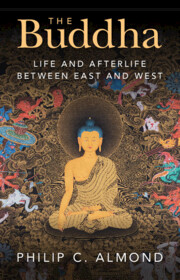
- Publisher:
- Cambridge University Press
- Online publication date:
- November 2023
- Print publication year:
- 2023
- Online ISBN:
- 9781009346788


Alongside Jesus and Muhammad, the Buddha is the most significant figure in the history of religion. Philip Almond's engaging new book is the first to combine a history of early traditions about Siddhartha Gautama's life with an authoritative account of how he and the tantalizing philosophy inspired by him came to the attention of the West. It takes the reader on a remarkable journey encompassing (among other topics) Alexander the Great, the courts of the Mongol Khans, Jesuit missions to China and Japan, and intrepid European travellers and scholars from the modern era. Melding Pali and Sanskrit sources with vivid reception, Almond presents the Buddha's story as multi-layered: one of transition from a world of angels and demons, water and tree spirits, to an altogether different context where Buddhism mixed with the cultural preoccupations of those who tentatively – sometimes following false trails – tried to make sense of its fascinating complexity.
‘Philip Almond is an excellent cultural historian and his research into the early centuries of the encounter between Buddhism and the West is fascinating. There has been no single book that both gives a composite account of the life of the Buddha and narrates how the Buddha came to the West – and Almond offers us precisely this. The author's prose is accessible and engaging throughout and the breadth of his historical reading highly commendable.'
Elizabeth J. Harris - President, UK Association for Buddhist Studies
‘Philip Almond's The British Discovery of Buddhism (1988) was a transformative book for those of us concerned with the structure of scholarly endeavor and the sociology of knowledge in ‘oriental studies.' The approach that the author takes to his new biography of the Buddha is similarly well-considered and very much in line with the best current scholarship on the topic. More and more, cultural historians are recognizing that the ‘bare facts' of historical events do not best reflect the complex cultural realities of the histories as received and transmitted by actual human beings in time. An old, worn orientalist trope is that the Buddha was a ‘sober-minded rationalist' whose teachings were corrupted by the delusions of Asian followers, addicted to magic and mystery. This orientalist trope is itself part of the complex of cultural imaginations of the modern West-patterns of thinking whose history was given critical attention by Almond's own ground-breaking British Discovery (mentioned above). ‘
Christian K. Wedemeyer - University of Chicago
‘Smoothly integrating two millennia’s worth of diverse historical accounts, Almond contextualizes Buddha’s shifting portrayal as divine being, teacher, ideal everyman, and symbol of happiness—an ‘exemplary human figure’ onto which cultural values and understandings of the East are projected and mediated. This belongs on the bookshelf of any serious student of Buddhism.’
Source: Publishers Weekly
 Loading metrics...
Loading metrics...
* Views captured on Cambridge Core between #date#. This data will be updated every 24 hours.
Usage data cannot currently be displayed.